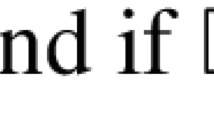Conclusion
In his paper Leblanc seeks to supplant traditional forms of semantic theory with truth-value analyses. I have tried, here, to extend the scope, if not the limits, of his results. But now, in closing, I wish to register some reservations about his notion of relevance.
Leblanc eschews the customary semantic analysis of intensional languages — the so-called ‘possible worlds’ semantics — as making ‘metaphysical virtue out of logical necessity’. And so he would replace such accounts with ‘truth-value’ analyses. But, alas, these theories are seen to have only limited application. Either all the atoms of a language must be evaluated by the functions in W in a truth-value ℋ 〈W, α, R〉, or the functions must be indexed. Because I share Leblanc's opinion that it ought to be that only the atoms of a theory are linguistically pertinent to it, I opt for the second alternative. Here, of course, things work out all right. But, as Leblanc notes, indexing the functions is equivalent to doing semantics in the usual way. In either case, new parameters are required for the evaluation of theories. So more than just the truth-values of a theory's atoms is relevant.
My concern is with natural languages. It has long been recognized — though only more recently well articulated4 — that an adequate semantic analysis of such languages, with their indexical and intensional features, must relativize the notion of truth to various indices, viz., aspects of the contexts of utterance of sentences. It is clear that the truth-value of ‘If your feet hurt, then it may rain tomorrow’ depends on more than just the truth-values of its atoms: the speaker, hearer, place, and time of utterance of the sentence are at least to be included among the extra-linguistic features required for an evaluation of the sentence. Such indices thus provide various realizations of the notion of a possible world, and they are all relevant.
Similar content being viewed by others
Bibliography
Bar-Hillel, Yehoshua, 1954, ‘Indexical Expressions’, Mind 63, 359–79.
Cresswell, M. J., 1970, ‘Classical Intensional Logics’, Theoria 36, 347–72.
Davidson, Donald, 1967, ‘Truth and Meaning’, Synthese 17, 304–23.
Davidson, Donald, 1970, ‘Semantics for Natural Languages’, Linguaggi nella società e nella tecnica (ed. by B. Visentini et al.), Milan, 177–88.
Gabbay, Dov M., 1969, Montague Type Semantics for Non-Classical Logics I, U.S. Air Force Office of Scientific Research, contract No. F 61052-68-C-0036, Scientific Report No. 4.
Montague, Richard, 1968, ‘Pragmatics’, Contemporary Philosophy — La Philosophie contemporaine, Vol. 1, (ed. by Raymond Klibansky), Florence, 102–22.
Montague, Richard, 1970, ‘Pragmatics and Intensional Logic’, Synthese 22, 68–94.
Scott, Dana, 1970, ‘Advice on Modal Logic’, Philosophical Problems in Logic (ed. by Karel, Lambert), D. Reidel Publ. Co., Dordrecht-Holland, 143–73.
Author information
Authors and Affiliations
Additional information
My thanks to Hugues Leblanc for help in constructing this reply.
Rights and permissions
About this article
Cite this article
Chellas, B.F. Notions of relevance. J Philos Logic 1, 287–293 (1972). https://doi.org/10.1007/BF00255562
Issue Date:
DOI: https://doi.org/10.1007/BF00255562




